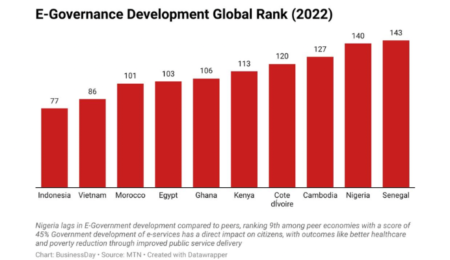Juliet Ehimaun, former Director for West Africa at Google, said that the technology company has helped, through its startup accelerator programme, create some of the very big, billion-dollar tech companies in Nigeria. These technological gaints known in the tech space as unicorns, are billion-dollar companies making enormous impact in the lives of millions of people.
Ehimaun disclosed this during her exclusive interview on the Arise Television Global Businesses programme on Friday. In highlighting this great feat of the California-based company, which opened shop in Nigeria 12 years ago, the former Google Director recounted some of her fun but very important achievements during her time at Google.
“I am really proud that some of the unicorns we have in Nigeria were part of our Google Startup Accelerator programme,” Ehimuan said. “That is a mentorship programme that we have been running on a year-on-year basis for a while. Which includes mentorship, funding, and support to help them grow and scale their businesses.”
Not disclosing many facts about these unicorns who play in the same league as Flutterwave, the business executive credited with driving Google’s impact in the lives of Nigerians both in the private and public space listed some of the other achievements of the company.
She added that the tech company has, during the last 12 years, trained over 6 million Nigerians, giving them valuable skills that have helped them contribute meaningfully to their personal growth and that of the country.
“We have trained over 6 million people, including developers, because if you are looking to energise the digital space, you need people with skills that can build applications and solutions,” she said.
The elegant executive, whose inroads into the male-dominated tech ecosystem have not gone unnoticed with several indigenous and international awards, also stated how, during her time, the company invested heavily in capacity building and training over 100,000 developers in the country.
“We have also invested in training 100,000 developers’ in-depth skills around building mobile Apps, cloud-based systems using machine learning, and many more,” she recounted.
All these have been part of the tech company’s strategy to drive capacity building, she said. Noting that the country has been better for it as this has translated to a large number of Nigerians participating in the global tech ecosystem.
In the area of content creation, the former director was emphatic, recounting how impactful the company has been in this digital space.
Read also: Juliet Ehimuan steps down as Google West Africa director
She applauded how Nigerians have grown in the creative art industry by making the best use of digital creative platforms such as YouTube, Facebook, Instagram, and others.
“In terms of content, we have seen African content coming online in a really big way. If I start with the creative industry, you will know that we have a lot of creative talent in terms of music, movies (the Nollywood industry), and other forms of content.
“You know a lot of those content pieces are being digitised, and we have a generation of online entrepreneurs that are monetizing platforms like YouTube.
“We have over 12,000 content partners on YouTube that are monetizing in a big way, and that is a big way of diversifying the economy, encouraging export—exporting our talent and culture—and attracting investment,” she explained.
Earlier in the interview, she recounted how far Google had grown from two staff to the hundreds that have helped push internet penetration among Nigerians. Taking into account the very small number of Nigerians who had access to the internet 12 years ago to millions who access the internet daily.
She gave credence to the huge investment the company made in infrastructure and the growth of more affordable smart phones.
“When I started at Google about 12 years ago, it was a small office of two people, and year-on-year internet growth was really small and a very small percentage of the population.
“When I look back and reflect on the growth across three areas—one is in terms of infrastructure—because that is the starting point, for people to get online, they need access in terms of connectivity and also devices,” she added.
Ehimuan explained that with the Equiano cable set to officially kick off very soon, the ICT sector will grow even further with connectivity with the rest of the world much closer.






